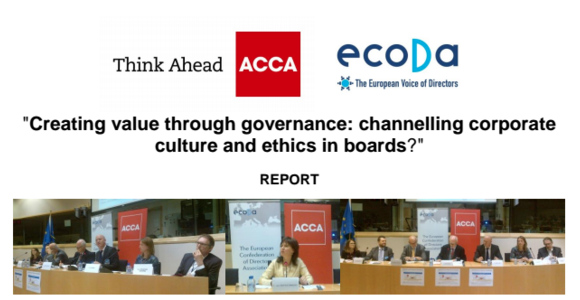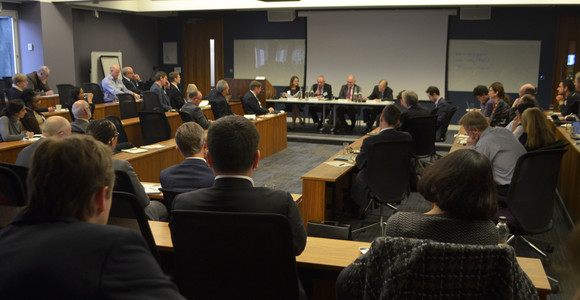Speakers and participants discussed the evolution of corporate accounting practice and policy, taking into account the needs of long-term investors and an integrated approach to value creation, as well as provided guidance to companies on how to comply with a rapidly evolving regulatory environment.
Summary of the discussion available here.
Date and venue:
June 7, 2017 Cass Business School. 106 Bunhill Row, London EC1Y 8TZ, UK
Speakers:
-
Opening keynote address: Richard Howitt, CEO of the International Integrated Reporting Council (IIRC)
-
David Cooke, Lawyer at ClientEarth
-
Stephanie Hime, Director at Little Blue Research
-
Yukako Kinoshita, Corporate Responsibility and EU Policy Research, Hitachi
-
Charlotte Villiers, Professor of Company Law, University of Bristol
-
Ladislas Smia, Deputy-head of Responsible Investment Research, Mirova
-
Omar Selim, CEO, Arabesque Partners
-
Jo Iwasaki, Head of Corporate Governance, Professional Insights, ACCA (moderator)
-
Paige Morrow, Head of Brussels Operations at Frank Bold (Moderator)
Background briefing
Introduction
Building on the results of the previous two seminars held at Cass Business School in Spring 2017, which addressed the issues of directors’ duties and systemic risks, this seminar will identify best practice and the desired development of reporting and accounting practice and policy. We will engage with corporate purpose, fiduciary duties, long-term and ESG risks, and integrated reporting and relate these to new and evolving legislative requirements that aim to support long-term oriented governance, such as the EU Non-Financial Reporting Directive.
The form of corporate reporting used influences how corporate boards establish their targets and decide on the means to achieve them. Traditional company reporting requirements concentrate on financial reporting, consisting of the balance sheet, the profit and loss account and the notes.
Current accounting models do not address several issues that are essential for a corporation’s ability to create sustainable value, in particular information about social and environmental risks and benefits, systemic risks, non-financial capitals and intangible assets. Thus, the US has adopted Generally Accepted Accounting Principles (GAAP) and in the European Union, all listed corporations must publish their financial statements on the basis of International Financial Reporting Standards (IFRS). Both reporting frameworks focus narrowly on financial reporting as a mechanism to provide information to absentee investors and creditors in order to support their decisions. The practice of quarterly financial reporting, still required in the U.S. and by some European stock exchanges, further limits corporate focus in terms of relevant audiences, interests and time frames.
Mandatory non-financial reporting requirements
In the past decade, there have been increasing requirements for non/extra-financial reporting, albeit with limited provision for monitoring or enforcement, and insufficient connection to financial reporting.
Section 414C of the Companies Act 2006 outlines content requirements for the Strategic Report. Quoted companies (as defined in the Act) must disclose:
-
‘a fair review of the company’s business’;
-
‘a description of the principal risks and uncertainties facing the company’;
-
‘the main trends and factors likely to affect the future development performance and position of the company’s business’; and
-
‘information about environmental matters (including the impact of the company’s business on the environment)’.
Until now, only UK listed companies have had to disclose information on areas related to environmental, social and employee matters in the Strategic Report. FRC guidance is that company directors should consider the full range of business risks including both those that are financial in nature and those that are non-financial in the strategic report.
New UK non-financial reporting requirements
With the adoption of The Companies, Partnerships and Groups (Accounts and Non- Financial Reporting) Regulations 2016 to transpose the EU Non-Financial Reporting Directive in the UK, this requirement has been extended to all Public Interest Entities (PIEs) (traded, banking and authorised insurance companies, and companies carrying out insurance market activity) with more than 500 employees. The new rules introduce some new areas to address even for companies that were previously required to report – notably, anti-corruption and bribery, as well as diversity matters.
The Directive is also more detailed on what needs to be disclosed in each area, and requires the disclosures to be described in the context of the overall business model. Subsequently, the Financial Reporting Council and the European Commission will publish guidance for companies to implement the new requirements. At a minimum, disclosure will be expected to cover the following:
-
Environmental matters: in addition to greenhouse gas emissions, disclosure of the current and foreseeable impacts of the entity’s operations on the environment, and, as appropriate, on health and safety, the use of renewable and/or non-renewable energy, water use and air pollution.
-
Social matters: actions taken to attain gender equality, implementation of fundamental conventions of the International Labour Organisation, working conditions, social dialogue, respect for the right of workers to be informed and consulted, respect for trade union rights, health and safety at work and the dialogue with local communities, and/or the actions taken to ensure the protection and the development of those communities.
-
Human rights matters: these may originate in the entity’s own activities or may be linked to its operations, and, where relevant and proportionate, its products, services and business relationships, including its supply and subcontracting chains.
In addition, the UK Modern Slavery Act 2015 requires companies doing business in the UK to report on their supply chain due diligence. Companies with cross-border or global operations should be aware of overlapping requirements that may apply, including the French ‘duty of vigilance’ law, the California Transparency in Supply Chains Act 2010 and national laws pursuant to the OECD Anti-Bribery Convention (including the UK Bribery Act 2010).
Integrating the financial and non-financial
Corporate reporting’s objective is now rapidly evolving from a narrow focus on financial information, which is relevant for short-term shareholder value, towards a future-oriented focus that looks outside of the mere confines of the corporation and considers the role of non-financial capitals and stakeholder relations. Increasingly, the trend is to integrate financial and non-financial information for the purpose of strategic planning and to provide investors and other stakeholders with a holistic picture of the firm. This trend is supported by research that shows that corporations with good ESG performance and reporting outperform their peers on the stock market in the long-term and benefit from lower cost of capital.
There exists a dizzying array of non-financial reporting principles, frameworks and methodologies (including CDP, CDSB, GRI, IIRC, ISO, NCC, SASB, UNGC, UN Guiding Principles Reporting Framework, UNPRI and sustainability indices). A growing number of entities are opting to use Integrated Reporting (<IR>) as an overarching structure for their reporting, recognizing that <IR> is more than the publication of an integrated report – it is a iterative process.
If done properly, integrated reporting can strengthen governance and enable more informed decision making both internally (by management and the board) and externally (by investors and other stakeholders). If used as a box-ticking exercise, <IR> or other reporting frameworks can standardize disclosure at the expense of providing complete information on the entity’s performance and prospects. Indeed, research from PRI, the UN Global Compact, Eurosif and ACCA concluded that investors do not believe corporate reporting sufficiently connects non-financial factors and business strategy and risk
Useful resources:
First event on the "Key principles of a new corporate governance"




















